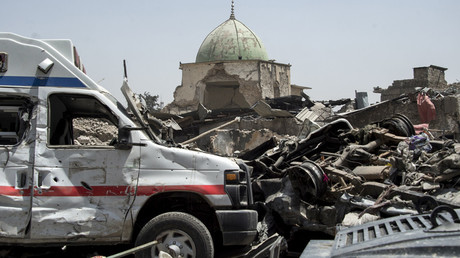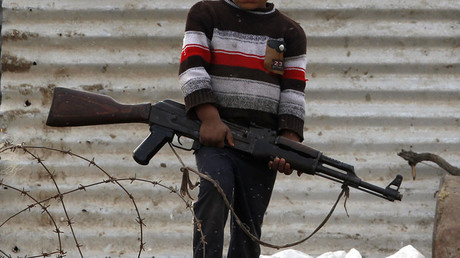Russia seeks to repatriate dozens of children in Mosul whose parents joined ISIS

© Ruptly / Ruptly
A four-year-old Chechen boy has been brought back to Russia after living with his jihadist father, who was fighting alongside ISIS in Mosul. Russian authorities are now seeking the return of several dozen such children from Iraqi orphanages.
Bilal Tagirov’s mother hadn’t seen him for two years. In October 2015, the child was kidnapped from his native Chechnya by his father, Khasan Tagirov, who went to fight alongside Islamic State jihadists, first in Syria and then in Iraq.
“For the past two years I had cherished the hope that my son would come back,” Bilal’s mother, Zalikha Ashakhanova, 24, said.“There have been attempts to bring him home. Finally, my dream came true.”
After two years of unsuccessful searches, Zalikha finally saw her son for the first time in a video from the liberated city of Mosul, uploaded on the internet.
“After watching the video with my boy, I was in shock. I hadn’t seen him for two years, but immediately recognized him. He almost did not change… I definitely recognized his voice. The mannerisms remained the same. On this video, there was his father in the background. Everyone recognized him, my mother and his relatives,” the boy’s mother recalls.
The woman immediately turned for help to the prosecutor’s office. The head of the Chechen Republic, Ramzan Kadyrov, helped organize the boy’s search and rescue operation.
Last week, Bilal finally came back home from Baghdad to Grozny.
“He had lived through so many tragic days it would be enough for a hundred lives. Mosul lies in ruins. Bilal and his father were found half alive in the city’s ruins. The boy needed immediate help, otherwise he would not have survived,” Kadyrov wrote on Instagram.
Russian authorities are now trying to bring back home other children stuck in Mosul.
READ MORE: Children still trapped in Mosul in dire need of protection – UNICEF
According to Samih Beno, a Jordanian politician of Chechen origin, 48 minors, presumably children of Russian citizens, are now being held in different Iraqi shelters. Beno, also the head of the Chechen Republic’s Friends Association in Jordan, helped begin the evacuation and serves as a mediator during talks between representatives of different countries and international public organizations. No concrete date as to when minors could be brought back home can be set at the moment, as the process of their return is full of legal complications. To bring the children back, it must be confirmed they are all Russian citizens, which is not easy as the minors lack documents proving their identity and can hardly tell the authorities anything about themselves or their family aside from a name. According to Beno, the kids will have to undergo a DNA test to prove they are relatives with people who claim so.
The Minister of Labor and Social Affairs, Mr. Mohamed Shiaa Al-Sudani, told RT that some of the children had arrived in the country along with foreign fighters, and others were born in Iraq.
The Iraqi Ministry of Labor and Social Affairs has developed an extensive program to take care of children from the IS-liberated areas in coordination with several ministries, civil society groups and international organizations like UNICEF.
“We have accepted a large number of children from the province of Nineveh. A lot of children. Some of them are of unknown origin, some got lost. Others were abandoned by their parents for various reasons,” Dr Abeer Mahde Alchalabi, Director General of Social Special Needs, and Office Director of the Child Welfare Commission, told RT.
“Before being placed in the shelter, their health condition was depressing. They suffered from mental and skin diseases as a result of a long stay in those [Islamic State] camps…
Some children have broken legs or hands. This is because they were abandoned by their parents and for a long time had stayed without any further care. Among them there are Iraqi children of Yazidi mothers. There are Chechen children, Chinese, there is one French child. All these children have been placed in the shelters… We consider them to be the victims. They are not guilty of anything. Of course, if the child’s father is from ISIS, the child is not to blame,” Dr Alchalabi said.
READ MORE: ‘Collective punishment & war crimes’: HRW condemns forced relocation of ISIS families in Iraq
The Russian Foreign Ministry, the Chechen Republic, the Federation Council, as well as Jordanian and Iraqi politicians are involved in negotiations to return children to their homeland. Before rejoining their families, some of the children will have to first receive medical and psychological help in special rehabilitation facilities, according to Russia’s children’s ombudsman Anna Kuznetsova.
Last month Mosul was declared liberated from Islamic State (IS, formerly ISIS/ISIL) terrorists. Iraqi and US-led forces have faced severe criticism from human rights organizations and the international community for the eight-month-long operation to retake the city, as it caused civilian casualties and massive displacement.
Human Rights Watch (HRW) said in mid-July that forced relocations of alleged IS terrorists’ families to a “rehabilitation camp” in Iraq are an act of collective punishment. HRW said that at least 170 families of suspected ISIS fighters, mainly women and children, were relocated against their will to a closed“rehabilitation camp” in Bartalla, 14 kilometers east of Mosul, Iraq, recently retaken from terrorists. Belkis Wille, a senior Iraq and Qatar researcher for HRW’s Middle East and North Africa division, told RT that she visited the camp, describing it as “incredibly bleak.”
“[There are] almost no humanitarian services, and hundreds of families of women, kids, who have no understanding of how long they’re going to be there and why they’re essentially being held prisoner,” Wille said.
S


